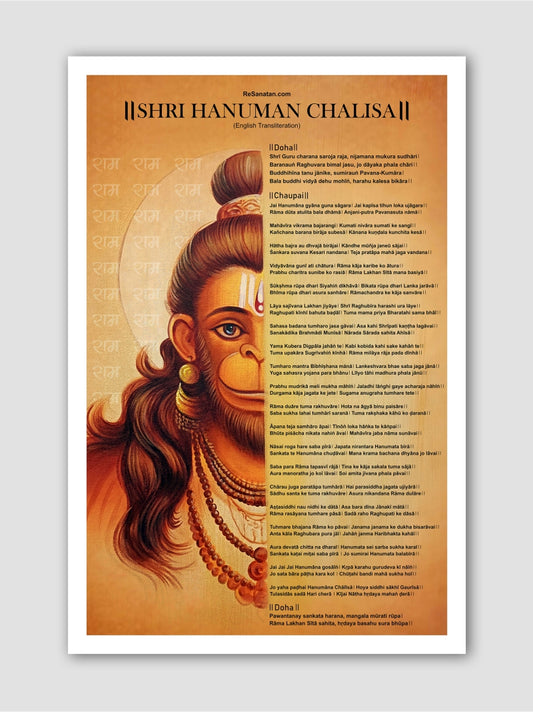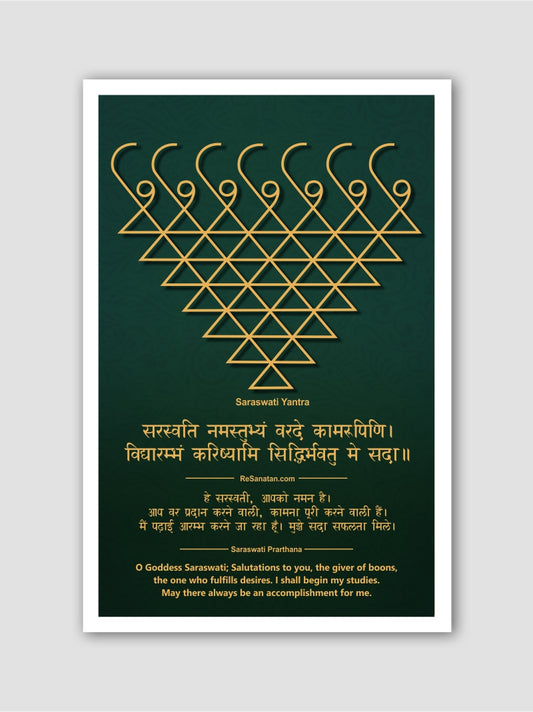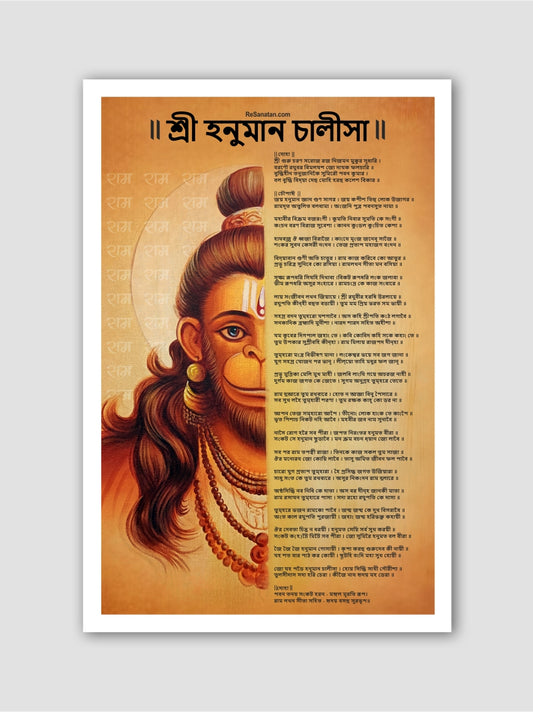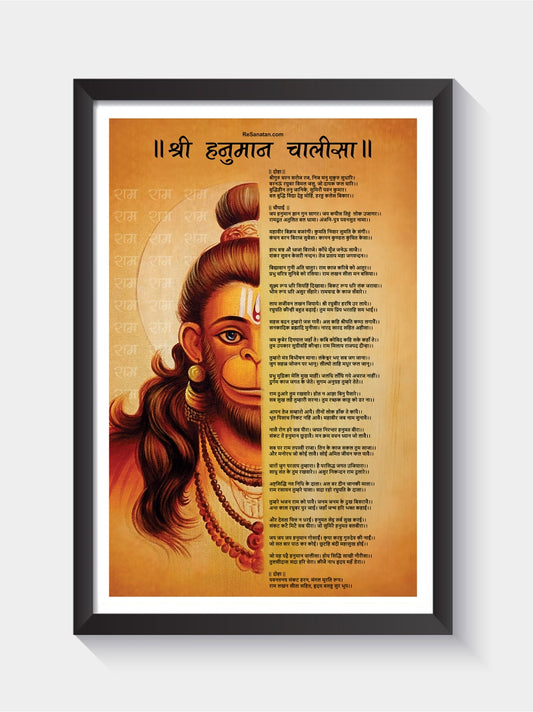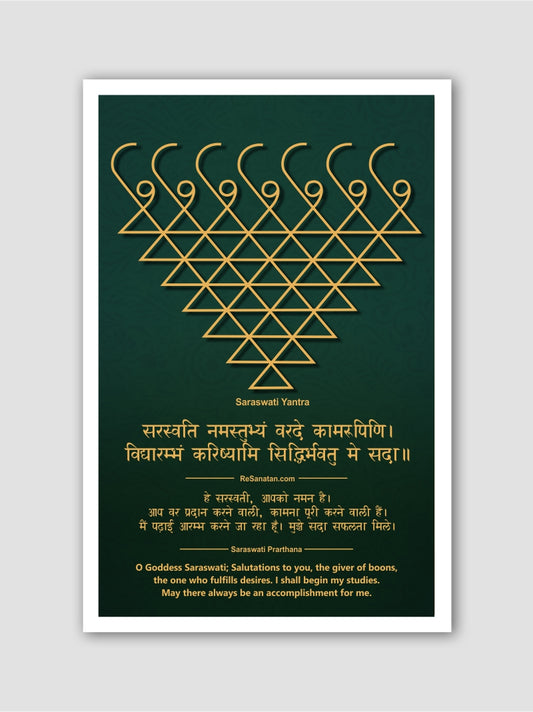
Shri Hanuman Chalisa : Lyrics in English, Meaning & Significance
Share
The Shri Hanuman Chalisa, a sacred Hindu hymn dedicated to Lord Hanuman, holds immense significance in the hearts of devotees. Composed by the great Indian saint Tulsidas, this devotional prayer encapsulates the virtues, exploits, and divine qualities of Lord Hanuman. In this article, we present the lyrics of the Shri Hanuman Chalisa in English, along with an exploration of its profound meaning and significance.
Shri Hanuman Chalisa : Lyrics in English
Hriday Basahu Sur Bhoop.
👉 Shop/Gift Shri Hanuman Chalisa Wall Frame (Hindi) - Framed Wall Art
👉 Shop/Gift Shri Hanuman Chalisa Wall Poster (Hindi) - Printed Wall Art on 300 GSM Art Paper

👉 Download Shri Hanuman Chalisa Wall Poster (Hindi) Digital PDF

👉 Download Shri Hanuman Chalisa Wall Poster (English Transliteration) Digital PDF
Shri Hanuman Chalisa : Translation, Meaning & Significance:
Translation: With the dust of Guru's lotus feet, I clean the mirror of my mind, And describe the pure glory of Lord Ram, The bestower of all blessings.
Meaning: In this opening verse of the Hanuman Chalisa, the poet expresses devotion to the lotus feet of the revered Guru (spiritual teacher). The poet humbly compares the mind to a mirror that needs to be cleansed. Just as a mirror is cleaned to reflect clearly, the poet seeks to purify their mind and thoughts.
The verse continues by describing the glory and purity of Lord Ram, who is regarded as an incarnation of Lord Vishnu. The poet acknowledges Lord Ram as the bestower of all blessings and virtuous fruits. It signifies the poet's intention to offer praise and express gratitude to Lord Ram through the recitation of the Hanuman Chalisa.
This verse sets the tone for the rest of the Hanuman Chalisa, emphasizing the importance of cleansing one's mind and seeking the divine blessings of Lord Ram. It reflects the devotee's deep reverence, humility, and desire to connect with the divine through the recitation of this sacred hymn.
2: "Budhi Heen Tanu Janike, Sumirow Pavan Kumar, Bal Buddhi Vidya Dehu Mohi, Harahu Kalesh Vikaar."
Translation: Knowing myself to be ignorant and lacking, I invoke the son of the wind, Lord Hanuman, Grant me strength, wisdom, and knowledge, And remove all my afflictions and impurities.
Meaning: In this verse of the Hanuman Chalisa, the devotee recognizes their own limitations and acknowledges their ignorance and shortcomings. They humbly seek the blessings of Lord Hanuman, who is referred to as "Pavan Kumar" or the son of the wind.
The devotee implores Hanuman to bestow upon them strength, wisdom, and knowledge. The request for strength implies the desire for physical and mental strength to overcome challenges and obstacles. The plea for wisdom indicates the yearning for discernment and clarity in making decisions and navigating life's complexities. The request for knowledge reflects the aspiration for spiritual knowledge and understanding.
Furthermore, the devotee seeks relief from afflictions and impurities. They beseech Hanuman to remove any negative influences, doubts, or troubles that hinder their spiritual progress and well-being.
3: "Jai Hanuman Gyan Gun Sagar, Jai Kapis Tihun Lok Ujagar, Ramdoot Atulit Bal Dhamaa, Anjani-Putra Pavan Sut Namaa."
Translation: Hail Hanuman, the ocean of wisdom and virtues, Hail the illuminator of the three worlds, The messenger of Lord Ram, possessing immeasurable strength, Known as the son of Anjani and the wind.
Meaning: This verse of the Hanuman Chalisa exalts the qualities and significance of Lord Hanuman. It begins with the expression "Jai Hanuman," signifying reverence and praise.
The verse describes Hanuman as the "Gyan Gun Sagar," the ocean of wisdom and virtues. This highlights his exceptional knowledge, spiritual wisdom, and virtuous qualities. Hanuman is considered a symbol of wisdom, intelligence, and divine insight.
He is further hailed as the "Kapis," meaning the illuminator or enlightener of the three worlds. This emphasizes Hanuman's role as a guide and source of enlightenment for all realms, including the physical, astral, and celestial worlds.
The verse goes on to depict Hanuman as the messenger of Lord Ram, emphasizing his divine connection to Lord Ram, an incarnation of Lord Vishnu. Hanuman is described as possessing immeasurable strength, symbolizing his immense power and ability to overcome any obstacles.
Lastly, Hanuman is recognized as the son of Anjani and the wind, reinforcing his divine lineage and connection to the elements.
4: "Mahavir Vikram Bajrangi, Kumati Nivar Sumati Ke Sangi. Kanchan Baran Biraaj Subesa, Kanan Kundal Kunchit Kesha."
Translation: O mighty and courageous Bajrangi (another name for Hanuman), Dispeller of evil thoughts and companion of noble intellect, Your golden complexion shines with splendor, With earrings adorning your ears and curly locks of hair.
Meaning: In this verse of the Hanuman Chalisa, Hanuman is extolled for his remarkable qualities and appearance. The verse begins by addressing him as "Mahavir Vikram Bajrangi," which means mighty and courageous, and also refers to him as Bajrangi, which signifies his association with Vajra (thunderbolt) and immense strength.
Hanuman is praised for his ability to dispel negative or wicked thoughts ("Kumati Nivar") and for being a companion or supporter of noble intellects ("Sumati Ke Sangi"). He helps eradicate ignorance and guides individuals towards righteous thoughts and actions.
The verse further describes Hanuman's physical attributes. His golden complexion is depicted as radiant and resplendent ("Kanchan Baran Biraaj Subesa"). This symbolism suggests his divine aura and brilliance.
Hanuman is also depicted as wearing earrings ("Kanan Kundal") and having curly locks of hair ("Kunchit Kesha"). These descriptions add to his divine beauty and adornments.
5: "Hath Vajra Aur Dhvaja Viraje, Kaandhe Moonj Janeu Saaje. Shankar Suvan Kesari Nandan, Tej Pratap Maha Jag Vandan."
Translation: In your hands shine the thunderbolt and the flag, On your shoulder rests a sacred thread made of Munja grass. You are the son of Shankar (Lord Shiva) and Kesari, Your radiance and glory are revered by the whole world.
Meaning: In this verse of the Hanuman Chalisa vividly describes some of the distinguishing symbols and lineage associated with Lord Hanuman.
The verse highlights the objects held by Hanuman. In one hand, he carries the Vajra, symbolizing a thunderbolt or weapon that signifies his strength and invincibility. In the other hand, he holds the Dhvaja, a flag representing victory and protection.
Additionally, Hanuman is depicted wearing a sacred thread made of Munja grass (a type of sacred grass) on his shoulder. This thread, known as the Janeu, is traditionally worn by individuals as a symbol of their spiritual initiation and connection to higher realms.
The verse further emphasizes Hanuman's lineage. He is described as the son of Shankar (Lord Shiva) and Kesari, the fatherly figure associated with the lion. This lineage signifies his divine parentage, with Shiva representing divine consciousness and Kesari symbolizing power and courage.
The verse concludes by acknowledging Hanuman's immense radiance and glory, which are revered not only by humans but by the entire world.
6: "Vidya Van Guni Ati Chatur, Ram Kaj Karibe ko Aatur. Prabhu Charitra Sunibe Ko Rasiya, Ram Lakhan Sita Man Basiya."
Translation: You possess immense knowledge, virtues, and intelligence, You are eager to perform Lord Ram's tasks. You delight in listening to the divine stories of Lord Ram, With Ram, Lakshman, and Sita residing in your heart.
Meaning: This verse is Verse of the Hanuman Chalisa and describes the exceptional qualities and devotion of Lord Hanuman towards Lord Ram.
The verse begins by praising Hanuman's attributes, stating that he possesses vast knowledge, virtues, and intelligence ("Vidya Van Guni Ati Chatur"). This highlights Hanuman's wisdom and intellectual prowess. He is depicted as highly learned and endowed with exceptional qualities.
Furthermore, the verse emphasizes Hanuman's unwavering eagerness and enthusiasm to fulfill Lord Ram's tasks ("Ram Kaj Karibe ko Aatur"). Hanuman is portrayed as being devoted and dedicated to carrying out the responsibilities assigned by Lord Ram. He is always eager to serve and accomplish any duty assigned to him by his beloved Lord.
The verse also mentions Hanuman's deep affection for Lord Ram and his delight in listening to the divine stories and exploits of Lord Ram ("Prabhu Charitra Sunibe Ko Rasiya"). Hanuman takes immense joy and pleasure in hearing about the divine qualities and heroic deeds of Lord Ram. It reflects his profound devotion and love for Lord Ram.
The final line of the verse states that Lord Ram, Lakshman, and Sita reside in Hanuman's heart ("Ram Lakhan Sita Man Basiya"). This signifies the deep and inseparable connection between Hanuman and the divine trio. It implies that Hanuman holds them in his heart, symbolizing his unbreakable bond and unwavering loyalty towards Lord Ram, his loyal brother Lakshman, and the virtuous goddess Sita.
7: "Sukshma Roop Dhari Siyahin Dikhawa, Vikat Roop Dhari Lanka Jarawa. Bhim rup dhari asur sanghare, Ramchandra ke kaaj sanvare."
Translation: In your subtle form, you appeared as a blackened figure, And in a monstrous form, you destroyed Lanka. Assuming a gigantic form, you vanquished the demons, Fulfilling the tasks of Lord Ram.
Meaning: This verse of the Hanuman Chalisa, describes the different forms that Lord Hanuman assumed during significant events in the Ramayana.
The verse begins by mentioning Hanuman's ability to take on a subtle form ("Sukshma Roop Dhari") and appear as a blackened figure ("Siyahin Dikhawa"). This refers to the incident when Hanuman entered the Ashoka Grove in Lanka to search for Sita, remaining inconspicuous by reducing his size and appearing as a small, blackened creature.
The verse then states that Hanuman assumed a monstrous form ("Vikat Roop Dhari") to destroy Lanka and defeat its inhabitants. This refers to the moment when Hanuman revealed his true gigantic form, displaying his immense strength and power. He wreaked havoc in Lanka, demolishing buildings, defeating demons, and creating chaos to demonstrate his loyalty to Lord Ram and rescue Sita.
The verse further mentions Hanuman taking on a gigantic form ("Bhim rup dhari") to confront and vanquish the demons. This highlights Hanuman's ability to transform into a formidable, awe-inspiring figure when faced with powerful adversaries.
The final line of the verse emphasizes that Hanuman accomplished all his tasks in service to Lord Ram ("Ramchandra ke kaaj sanvare"). It signifies Hanuman's unwavering dedication and commitment to fulfilling Lord Ram's missions and objectives.
8: "Laye Sanjivan Lakhan Jiyaye, Shri Raghuvir Harashi Ur Laiye. Raghupati Kinhi Bahut Badai, Tum Mam Priye Bharat Sam Bhai."
Translation: You brought the Sanjivani herb and revived Lakshman, Shri Raghuvir (Lord Ram) rejoiced and embraced you. Raghupati (Lord Ram) praised you profusely, Saying, "You are as dear to me as my own brother Bharat."
Meaning: This verse recounts a significant event from the Ramayana, highlighting Lord Hanuman's pivotal role in saving Lakshman's life.
The verse begins by stating that Hanuman brought the Sanjivani herb, a powerful life-restoring herb, and used it to revive Lakshman, Lord Ram's beloved brother. This incident occurred during the battle between Lord Ram's army and the forces of the demon king Ravana. Lakshman was severely injured, and Hanuman's timely retrieval of the Sanjivani herb saved his life.
The verse then describes how Lord Ram (referred to as Shri Raghuvir) was overjoyed and embraced Hanuman in gratitude. Lord Ram's happiness and appreciation for Hanuman's heroic deed are expressed, symbolizing the deep bond between them.
Furthermore, Lord Ram praised Hanuman extensively, acknowledging his remarkable achievements and expressing his profound admiration. Raghupati, another name for Lord Ram, praised Hanuman for his unwavering devotion, dedication, and selflessness.
The verse concludes with Lord Ram comparing Hanuman's dear relationship with him to that of his own brother Bharat. This comparison signifies the immense love and affection Lord Ram holds for Hanuman, equating their bond to the one he shares with his own brother Bharat.
9: "Sahas Badan Tumharo Jas Gaave, Asa Kahi Shripati Kanth Laagave. Sankadik Brahmadi Muneesa, Narad Sarad Sahit Aheesa."
Translation: The celestial beings and sages sing your praises, As you are embraced by Lord Ram with immense affection. Sankadik, Brahma, and the divine sages, Narad and Sarad, along with Ahesha, are present with reverence.
Meaning: This verse portrays the celestial beings, sages, and divine entities praising Lord Hanuman for his greatness and his close association with Lord Ram.
The verse begins by stating that the celestial beings and sages ("Sahas Badan") sing your praises, referring to Hanuman. This indicates that Hanuman's glory and virtues are recognized and admired by celestial beings and revered sages. They acknowledge his exceptional qualities and devotion.
The verse further describes that Hanuman is embraced by Lord Ram with great affection ("Asa Kahi Shripati Kanth Laagave"). This signifies the deep bond between Hanuman and Lord Ram. Lord Ram holds Hanuman dear to his heart and embraces him with love and reverence.
Furthermore, the verse mentions specific divine beings and sages who are present in the scene. Sankadik refers to the celestial beings and Brahma, the creator of the universe. The mention of these divine beings reinforces Hanuman's exalted position and his recognition among celestial realms.
Additionally, the verse mentions Narad and Sarad, who are revered sages known for their wisdom and devotion to Lord Ram. Their presence signifies their acknowledgement of Hanuman's greatness and their association with him.
Lastly, the verse mentions Ahesha, another name for Lord Shiva. His presence further enhances the divinity and auspiciousness of the scene, reinforcing the significance of Hanuman's relationship with Lord Ram.
10: "Jam Kuber Digpal Jahan Te, Kavi Kovid Kahi Sake Kahan Te.Tum Upkar Sugrivahi Keenha, Ram Milaye Rajpad Deenha."
Translation: You possess the power to travel to the realms of Yama (the god of death), Kubera (the god of wealth), and the guardians of the directions, No poet or scholar can adequately describe your virtues. You rendered a great service to Sugriva, Uniting him with Lord Ram and granting him the throne.
Meaning: This highlights Lord Hanuman's extraordinary abilities, his immeasurable virtues, and his significant role in aiding Sugriva and Lord Ram.
The verse begins by stating that Hanuman possesses the power to travel to various realms, including Yama (the god of death), Kubera (the god of wealth), and the guardians of the directions. This emphasizes Hanuman's exceptional abilities and his capability to navigate different dimensions, suggesting his supreme divine nature.
Furthermore, the verse expresses that no poet or scholar can adequately describe the virtues of Hanuman. This reflects the belief that Hanuman's virtues and qualities are beyond the capacity of human expression. It signifies the incomprehensible greatness and splendor of Hanuman's character.
The verse then mentions Hanuman's great service to Sugriva, the monkey king. Hanuman played a crucial role in aiding Sugriva by assisting him in his quest to reunite with Lord Ram. Hanuman's efforts were instrumental in bringing Sugriva and Lord Ram together, enabling them to forge a strong alliance.
Lastly, the verse states that as a result of Hanuman's selfless service, Sugriva was able to attain the throne ("Ram Milaye Rajpad Deenha"). Hanuman's intervention and assistance led to Sugriva's rightful claim to the throne and established him as the king.
11: "Tumharo Mantra Vibheeshan Maana, Lankeshwar Bhaye Sub Jag Jana.Yug Sahasra Yojan Par Bhanu, Leelyo Taahi Madhur Phal Janu."
Translation: Vibhishan, the brother of Ravana, heeded your counsel, And as a result, he became the king of Lanka, known to all. You swallowed the sun, located millions of miles away, Thinking it to be a ripe fruit, in your childlike innocence.
Meaning: This verse recounts significant events from the Ramayana, showcasing Lord Hanuman's wisdom, power, and innocence.
The verse begins by stating that Vibhishan, the brother of Ravana, accepted and followed Hanuman's counsel ("Tumharo Mantra Vibheeshan Maana"). Vibhishan sought Hanuman's guidance and acted upon it, leading to a significant turn of events. Vibhishan's decision to align himself with Lord Ram ultimately resulted in his becoming the king of Lanka, replacing Ravana.
Furthermore, the verse highlights that Vibhishan's acceptance of Hanuman's advice led to him becoming the ruler of Lanka, known to all ("Lankeshwar Bhaye Sub Jag Jana"). This emphasizes the pivotal role Hanuman played in influencing the course of events and the establishment of righteousness over evil.
The verse then describes Hanuman's remarkable feat of swallowing the sun, metaphorically referring to his extraordinary strength and power. The mention of the sun being located millions of miles away ("Yug Sahasra Yojan Par Bhanu") underscores the magnitude of Hanuman's capabilities.
Lastly, the verse explains that Hanuman mistook the sun for a ripe fruit and swallowed it, symbolizing his childlike innocence and playfulness ("Leelyo Taahi Madhur Phal Janu"). This incident portrays Hanuman's innocent nature and his ability to display childlike qualities despite his immense power.
12: "Prabhu Mudrika Meli Mukh Mahin, Jaladhi Langhi Gaye Acharaj Nahin. Durgaam Kaj Jagat Ke Jete, Sugam Anugraha Tumhre Tete."
Translation: With the Lord's signet ring in your mouth, You leaped across the ocean, performing a remarkable feat. You achieved difficult tasks in the world, And your grace brings comfort and blessings to all.
Meaning: This verse highlights Lord Hanuman's extraordinary abilities, his accomplishments, and the blessings he bestows upon the world.
The verse begins by mentioning that Hanuman held the Lord's signet ring in his mouth ("Prabhu Mudrika Meli Mukh Mahin"). This refers to the time when Hanuman acquired the ring from Lord Ram as a token of identification and allegiance. Hanuman carried the ring in his mouth as a symbol of his devotion and commitment to Lord Ram.
The verse further describes how Hanuman leaped across the ocean, accomplishing a remarkable feat ("Jaladhi Langhi Gaye Acharaj Nahin"). Hanuman's famous act of crossing the vast ocean between India and Lanka is highlighted here. It showcases his exceptional physical prowess and determination, as he traversed the great expanse effortlessly.
Additionally, the verse states that Hanuman achieved difficult tasks in the world ("Durgaam Kaj Jagat Ke Jete"). It emphasizes Hanuman's capability to overcome seemingly insurmountable challenges and accomplish remarkable feats. Hanuman's extraordinary abilities and dedication allowed him to fulfill various important tasks assigned to him.
The verse concludes by acknowledging the blessings and grace that Hanuman brings to the world ("Sugam Anugraha Tumhre Tete"). Hanuman's presence and benevolence bring comfort, solace, and blessings to all who seek his guidance and support. His divine grace is believed to alleviate difficulties and bring favorable outcomes.
13: "Ram Duare Tum Rakhvare, Hoat Na Agya Binu Paisare. Sab Sukh Lahai Tumhari Saran, Tum Rakshak Kaahu Ko Dar Na."
Translation: You are the guardian at the door of Lord Ram, No harm can come to anyone without your consent.
Taking refuge in you brings all happiness, With you as the protector, who should we fear?
Meaning: This continuation of the verse highlights the role of Hanuman as the guardian and protector of Lord Ram and all those who seek his shelter.
The verse begins by acknowledging Hanuman as the guardian at the door of Lord Ram ("Ram duare tum rakhvare"). Hanuman is considered as the ever-vigilant protector, standing at the gateway of Lord Ram's divine abode. He safeguards the devotees and ensures their well-being and safety.
The verse further emphasizes that no harm can befall anyone without Hanuman's consent ("Hoat na agya binu paisare"). It signifies the immense power and authority vested in Hanuman, implying that he has the ability to avert any danger or adversity that may come upon his devotees. Hanuman's divine presence acts as a shield, warding off evil and protecting those under his care.
The verse also highlights the significance of taking refuge in Hanuman ("Sab sukh lahaye tumhari sarna"). Seeking Hanuman's refuge brings forth all happiness and fulfillment. Hanuman is considered the bestower of blessings and the fulfiller of desires. Surrendering to him and seeking his shelter leads to the attainment of joy and contentment in life.
Lastly, the verse poses a rhetorical question, asking who should we fear when we have Hanuman as our protector ("Tum rakshak kahu ko dar na"). With Hanuman as the guardian, there is no need to fear anyone or anything. His unwavering support, guidance, and protection instill a sense of fearlessness and confidence in the hearts of his devotees.
Overall, this continuation of the verse exalts Hanuman as the divine guardian and protector. It underscores his authority in granting safety and well-being, emphasizing that seeking refuge in him brings immense happiness and dispels all fears. Hanuman's presence is believed to ensure the safeguarding and welfare of all those who approach him with devotion and trust.
14: "Aapan Tej Sambharo Aape, Tinou Lok Hank Te Kanpe. Bhoot Pishach Nikat Nahi Aave, Mahavir Jab Naam Sunave."
Translation: You contain your own splendor, Causing the three worlds to tremble. Ghosts and demons cannot approach, When the mighty Hanuman's name is invoked.
Oh Bajrang Bali, protect me, Taking refuge in you brings all happiness. With you as the protector, who should I fear? You contain your own splendor.
Meaning: This verse praises the immense power and divine presence of Hanuman, highlighting his ability to instill fear in negative forces and provide unwavering protection to his devotees.
The verse begins by acknowledging that Hanuman possesses and controls his own divine splendor ("Aapan Tej Sambharo Aape"). He radiates an extraordinary brilliance and energy, which he maintains within himself. This signifies his self-discipline and mastery over his divine strength.
Hanuman's sheer presence causes the three worlds to tremble ("Tinou Lok Hank Te Kanpe"). His awe-inspiring aura and divine majesty create a profound impact that reverberates throughout the realms of heaven, earth, and the underworld. This emphasizes his incomparable might and authority.
No ghosts or demons can approach or harm anyone when the mighty name of Hanuman is invoked ("Bhoot Pishach Nikat Nahi Aave"). The utterance of Hanuman's name acts as a powerful deterrent, repelling negative entities and ensuring their inability to come close. This emphasizes Hanuman's role as the conqueror of evil and protector against malevolent forces.
The verse then addresses Bajrang Bali, another name for Hanuman, requesting his protection and guardianship ("Oh Bajrang Bali, Meri Raksha Karo"). Taking refuge in Hanuman brings profound happiness and well-being ("Saba Sukh Lahay Tumhari Sarna"). Hanuman's divine shelter provides solace, peace, and the fulfillment of all desires.
With Hanuman as the protector, there is no need to fear anyone or anything ("Tum Rakshak Kaahu Ko Dar Na"). His presence assures the devotee that they are shielded from all dangers and obstacles. Hanuman's inherent splendor and power ensure the safety and security of those who seek his divine grace.
Overall, this verse emphasizes the unmatched strength and protective nature of Hanuman. It encourages devotees to take refuge in him, chant his name, and rely on his divine intervention. Hanuman's divine presence brings comfort, happiness, and a sense of fearlessness, assuring the devotee that they are under his unwavering care and safeguarding.
15: "Nase Rog Hare Sab Peera, Japat Nirantar Hanumat Veera. Sankat Te Hanuman Chudave, Man Kram Vachan Dhyan Jo Lave."
Translation: All diseases and afflictions are eliminated, By incessantly chanting the name of the valiant Hanuman. Hanuman rescues from troubles and challenges, When the mind, actions, and focus are devoted to him.
Meaning: This verse highlights the healing and protective power of Hanuman's name and the importance of unwavering devotion to him in overcoming difficulties.
It states that all diseases and afflictions ("Nase Rog Hare Sab Peera") are eradicated by continuously chanting the name of the courageous Hanuman ("Japat Nirantar Hanumat Veera"). The persistent repetition of Hanuman's name has the power to alleviate physical and mental suffering, providing relief and healing. It signifies Hanuman's ability to bring about holistic well-being and restore balance in one's life.
Furthermore, the verse acknowledges that Hanuman rescues individuals from troubles and challenges ("Sankat Te Hanuman Chudave"). When faced with various obstacles or adversities, seeking Hanuman's intervention and surrendering to him brings deliverance and liberation. Hanuman's divine grace is capable of freeing one from the grip of distress and providing solace.
The verse also emphasizes the importance of aligning one's mind, actions, and focus in the practice of devotion to Hanuman ("Man Kram Vachan Dhyan Jo Lave"). It suggests that true liberation from hardships comes through dedicating oneself to Hanuman, engaging in righteous actions, and maintaining focused awareness on his divine presence. By immersing oneself in the practice of devotion, one can experience the transformative power of Hanuman's blessings.
Overall, this verse underscores the healing and protective qualities of Hanuman's name. It encourages devotees to engage in continuous chanting, recognizing it as a powerful remedy for afflictions and challenges. It emphasizes the significance of unwavering devotion and the power of Hanuman's grace in overcoming obstacles, attaining well-being, and experiencing spiritual upliftment.
16: "Sabpar Ram Tapasvi Raja, Tin Ke Kaaj Sakal Tum Saja. Aur Manorath Jo Koi Laave, Soi Amit Jivan Phal Paave."
Translation: Lord Ram is the ascetic king of all, You fulfill all their tasks. And whoever brings their desires and aspirations, Attains eternal and abundant rewards.
Meaning: This verse highlights the supreme authority of Lord Ram and Hanuman's role as the devoted servant and executor of their divine will. It emphasizes the fulfillment of tasks assigned by Lord Ram and the rewarding outcomes for those who approach Hanuman with their desires.
The verse proclaims that Lord Ram is the ultimate ascetic king ("Sabpar Ram Tapasvi Raja"). Lord Ram is revered as the embodiment of righteousness, discipline, and spiritual austerity. Hanuman, as the devoted servant and representative of Lord Ram, is entrusted with the responsibility of accomplishing all tasks assigned by them ("Tin Ke Kaaj Sakal Tum Saja"). Hanuman executes all duties and missions with unwavering devotion and efficiency.
Additionally, the verse suggests that whoever approaches Hanuman with their desires and aspirations ("Aur Manorath Jo Koi Laave"), they receive abundant and eternal rewards ("Soi Amit Jivan Phal Paave"). Hanuman, being the epitome of devotion and selflessness, bestows blessings and fulfills the heartfelt wishes of those who seek his intervention. It signifies that approaching Hanuman with sincerity and devotion brings forth fruitful outcomes, leading to a fulfilling and abundant life.
Overall, this verse acknowledges Lord Ram as the supreme authority and highlights Hanuman's role as the obedient servant who executes their divine commands. It conveys the idea that by surrendering desires and aspirations to Hanuman and seeking his blessings, individuals receive abundant rewards and blessings in their lives. It reinforces the faith in Hanuman's ability to fulfill the desires of devotees and underscores the importance of approaching him with devotion and sincerity.
17: "Charo Jug Partap Tumhara, Hai Parasiddha Jagat Ujiyara. Sadhu Sant Ke Tum Rakhware, Asur Nikandan Ram Dulare."
Translation: Your glory is renowned in all four ages, You illuminate the entire world. You are the protector of saints and sages, And the destroyer of demons, beloved of Lord Ram.
Meaning: This verse highlights the divine significance and universal presence of Hanuman throughout the four ages. It emphasizes his role as a source of light and protection, and his association with Lord Ram.
The verse states that Hanuman's fame and glory transcend time and are celebrated in all four ages ("Charo Jug Partap Tumhara"). Hanuman's divine presence and influence extend beyond the boundaries of time, making him eternally relevant and revered. His divine essence illuminates the world, dispelling darkness and ignorance ("Hai Parasiddha Jagat Ujiyara").
Furthermore, the verse acknowledges Hanuman as the guardian and protector of saints and sages ("Sadhu Sant Ke Tum Rakhware"). He safeguards and guides the spiritual seekers, offering them his divine support and guidance. Hanuman's watchful presence ensures the well-being and spiritual progress of those dedicated to a righteous path.
Additionally, the verse identifies Hanuman as the vanquisher of demons and the beloved devotee of Lord Ram ("Asur Nikandan Ram Dulare"). Hanuman is renowned for his heroic deeds in defeating and overcoming the forces of evil. His unwavering devotion and loyalty to Lord Ram make him dear to the heart of his beloved deity.
Overall, this verse highlights the timeless and universal significance of Hanuman. It acknowledges his divine radiance, protective role, and his association with Lord Ram. It instills faith in Hanuman's power to dispel darkness, protect devotees, and overcome adversities. Hanuman's devotion and valor serve as an inspiration for spiritual seekers in their pursuit of righteousness and their battles against negativity and obstacles.
18: "Ast Siddhi Nav Nidhi Ke Data, Asa Bar Din Janki Mata. Ram Rasayan Tumhare Pasa, Sada Raho Raghupati Ke Dasa."
Translation: You possess the eight Siddhis and the nine treasures, You grant the desires of devotees every day, O Mother Janki. You hold the essence of Lord Ram's divine nectar, May you always remain devoted to Lord Raghupati.
Meaning: This verse glorifies Hanuman's divine powers, his ability to fulfill desires, and his unwavering devotion to Lord Ram.
The verse states that Hanuman possesses the eight Siddhis (supernatural powers) and the nine treasures ("Ast Siddhi Nav Nidhi Ke Data"). These Siddhis and Nidhis represent various mystical abilities and treasures that Hanuman possesses, enabling him to accomplish extraordinary feats and fulfill the desires of devotees. Hanuman is considered the bestower of these supernatural powers.
The verse further addresses Hanuman as the provider of blessings and fulfillment ("Asa Bar Din Janki Mata"). Devotees have unending faith and trust in Hanuman's ability to grant their wishes and fulfill their desires. Hanuman is seen as a compassionate and benevolent mother figure who listens to the prayers and aspirations of devotees.
It is mentioned that Hanuman holds the essence of Lord Ram's divine nectar ("Ram Rasayan Tumhare Pasa"). Hanuman embodies the teachings, virtues, and essence of Lord Ram's divine knowledge and spiritual wisdom. He carries the profound wisdom and teachings of Lord Ram within him and shares them with the devotees who seek his guidance and blessings.
The verse concludes by expressing the wish that Hanuman always remains devoted to Lord Raghupati, another name for Lord Ram ("Sada Raho Raghupati Ke Dasa"). It signifies the eternal bond between Hanuman and Lord Ram, emphasizing Hanuman's unwavering loyalty, dedication, and servitude to his beloved Lord.
Overall, this verse portrays Hanuman as the bestower of supernatural powers and fulfiller of devotees' desires. It highlights his connection to Lord Ram and his role as a divine mediator between devotees and the divine. Hanuman's divine grace and devotion inspire devotees to seek his blessings and guidance in their spiritual journey.
19: "Tumhare Bhajan Ram Ko Paave, Janam Janam Ke Dukh Bisraave. Anta Kaal Raghubar Pur Jaai, Jahan Janam Hari-Bhakt Kahai."
Translation: By singing your praises, one attains Lord Ram, And all the sorrows of countless lifetimes are forgotten. At the end of life, they reach Lord Ram's divine abode, Where they are called devotees of the Lord in every birth.
Meaning: This verse emphasizes the power of singing Hanuman's praises and the ultimate attainment of Lord Ram's divine grace through devotion.
It states that by engaging in the devotion and singing the praises of Hanuman ("Tumhare Bhajan Ram Ko Paave"), one establishes a deep connection with Lord Ram. Hanuman is seen as the gateway to Lord Ram's divine presence. Through devotion to Hanuman, devotees gain access to the divine blessings and grace of Lord Ram.
The verse further highlights the transformative effect of Hanuman's devotion on one's life. By immersing oneself in Hanuman's bhajans, all the sorrows and sufferings accumulated over countless lifetimes are eradicated ("Janam Janam Ke Dukh Bisraave"). The power of Hanuman's devotion and association with Lord Ram has the ability to alleviate the burdens and pain of past lives, offering solace and liberation to the devotees.
Additionally, the verse speaks of the ultimate destination of devotees who lead a life devoted to Lord Ram. At the end of their earthly journey ("Anta Kaal"), they attain Lord Ram's divine abode ("Raghubar Pur Jaai"). In that realm, they are recognized and known as devotees of the Lord in every subsequent birth ("Jahan Janam Hari-Bhakt Kahai"). This signifies the eternal bond between the devotee and Lord Ram, where the devotee's dedication and devotion are acknowledged and honored across lifetimes.
Overall, this verse emphasizes the transformative power of Hanuman's devotion. It highlights the significance of singing his praises as a means to attain Lord Ram's divine grace and liberation from worldly sufferings. The verse inspires devotees to engage in continuous devotion to Hanuman, recognizing it as a path to attain the eternal blessings of Lord Ram and transcend the cycle of birth and death.
20: "Aur Devat Chit Na Dharai, Hanumat Se Hi Sarve Sukh Karai. Sankat Kate Mite Sab Peera, Jo Sumire Hanumat Balbeera."
Translation: I do not contemplate upon any other deities, as Hanuman alone bestows all happiness. All troubles are eradicated, and every suffering is alleviated by remembering the mighty and courageous Hanuman.
Meaning: This verse emphasizes the exclusive devotion towards Hanuman and his ability to bring immense happiness and relief from troubles and suffering.
The verse states that the devotee does not divert their focus to any other deities ("Aur Devat Chit Na Dharai"). They recognize Hanuman as the sole source of fulfillment, joy, and blessings. All their prayers and devotion are directed towards Hanuman alone, for they believe that he possesses the power to grant all forms of happiness.
Furthermore, the verse highlights the extraordinary impact of Hanuman's grace and presence. By remembering and invoking Hanuman's name and virtues, all difficulties and challenges are overcome ("Sankat Kate Mite Sab Peera"). Hanuman's divine intervention removes all obstacles and brings an end to every form of suffering. His boundless strength and courage provide solace and relief to those who seek his assistance.
Overall, this verse emphasizes the complete devotion and faith in Hanuman. It acknowledges him as the sole bestower of happiness and the alleviator of suffering. By solely focusing on Hanuman and seeking his blessings, devotees find solace, strength, and liberation from their troubles. The verse inspires devotees to turn to Hanuman in times of need, recognizing him as the mighty and courageous protector who brings peace and prosperity into their lives.
21: "Jai Jai Jai Hanuman Gosai, Kripa Karahu Gurudev Ki Naai. Jo Sat Baar Paath Kar Koi, Chhutahi Bandi Maha Sukh Hoi."
Translation: Victory, victory, victory to Lord Hanuman, Bestow your grace, O revered Guru. Whoever recites this prayer one hundred times, They are freed from bondage and experience great bliss.
Meaning: This verse is an expression of reverence and praise for Lord Hanuman and his divine blessings. It emphasizes the significance of reciting this prayer and the resulting liberation and happiness that it brings.
The verse begins by chanting "Jai Jai Jai Hanuman Gosai," which is an invocation of victory and salutations to Lord Hanuman. It acknowledges his greatness, power, and divine status.
The verse then requests Hanuman to shower his grace and blessings, addressing him as "Gurudev" or revered Guru. It recognizes Hanuman as the guiding force, the spiritual teacher, who bestows his divine grace upon his devotees.
The verse further states that anyone who recites this prayer one hundred times with devotion and sincerity will be liberated from bondage and experience profound bliss. The repetition of the prayer is seen as a means of invoking Hanuman's divine presence and seeking his blessings. The devotee is promised freedom from all forms of limitations and suffering, and the attainment of immense happiness and contentment.
Overall, this verse serves as a devotional hymn praising Lord Hanuman and his ability to bestow grace and liberation upon his devotees. It highlights the transformative power of reciting this prayer with sincerity and devotion, emphasizing the freedom from bondage and the experience of profound joy that it brings. The verse inspires devotees to chant the prayer with utmost faith and dedication, seeking the divine blessings of Hanuman and surrendering to his divine will.
22: "Jo yah pade Hanuman Chalisa, Hoye siddhi sakhi Gaureesa. Tulsidas sada hari chera, Keejai dasa Hrdaya mein dera."
Translation: Whoever recites the Hanuman Chalisa, Attains profound spiritual accomplishments. Tulsidas, an eternal devotee of the Lord, Requests Hanuman to reside in his heart forever.
Meaning: This verse highlights the significance and benefits of reciting the Hanuman Chalisa, as well as the devotion of Tulsidas towards Hanuman.
The verse states that whoever recites the Hanuman Chalisa with sincerity and devotion achieves great spiritual accomplishments and blessings. The Chalisa is considered a powerful hymn that invokes Hanuman's presence and divine grace. It is believed to bring about various forms of spiritual attainments and fulfill the desires of the devotee.
The verse then identifies Tulsidas as the eternal devotee of the Lord, expressing his unwavering devotion and surrender to Hanuman. Tulsidas, the author of the Hanuman Chalisa, seeks Hanuman's continuous presence in his heart. He desires a deep connection and devotion towards Hanuman, requesting him to permanently reside within his being.
Overall, this verse emphasizes the transformative power of reciting the Hanuman Chalisa and the devotion of Tulsidas towards Hanuman. It encourages devotees to recite the Chalisa with faith and devotion, recognizing it as a means to attain spiritual accomplishments and seeking the eternal presence of Hanuman in their hearts.
23: "Pawan Tanay Sankat Haran, Mangal Murti Roop. Ram Lakhan Sita Sahit, Hriday Basahu Sur Bhoop."
Translation: O Hanuman, the son of the wind, the remover of distress, You possess an auspicious and divine form. You reside in the hearts of Lord Ram, Lakshman, and Sita, And you are adored by all the celestial beings.
Meaning: This verse praises the divine form and exalted status of Hanuman, highlighting his association with Lord Ram, Lakshman, and Sita, and his revered position among the celestial beings.
The verse begins by addressing Hanuman as "Pawan Tanay" or the son of the wind. It acknowledges his lineage and connection to Lord Vayu, the wind god. Hanuman is known for his extraordinary strength, agility, and swiftness, which are attributed to his divine heritage.
Furthermore, the verse describes Hanuman as the dispeller of difficulties and distress ("Sankat Haran"). Hanuman is renowned for his ability to remove obstacles and alleviate the troubles faced by devotees. He is regarded as the one who brings peace, harmony, and prosperity.
The verse also recognizes Hanuman's association with Lord Ram, Lakshman, and Sita. Hanuman is known for his unwavering devotion to Lord Ram, his selfless service to Lakshman, and his deep reverence for Sita. He resides in their hearts, symbolizing his inseparable connection with the divine trio.
Additionally, the verse acknowledges that Hanuman is highly esteemed by the celestial beings ("Sur Bhoop"). He is adored and respected by all the celestial entities and is considered a revered figure in the celestial realm.
Overall, this verse portrays Hanuman as the divine embodiment of auspiciousness and the remover of obstacles. It highlights his close association with Lord Ram, Lakshman, and Sita, and his exalted position among the celestial beings. The verse inspires devotion and reverence towards Hanuman, recognizing his divine qualities and the divine company he keeps.



